#archduke rudolf of austria
Note
Hii bestie! Hope you are feeling a bit better :)
I wanted to ask about archduke rudolf of austria. I find it so sad why was he treated so terribly that it drove him to suicide ( i believe the theories which suggests childhood trauma contributed to his suicidal thoughts) he was the prized male heir and instead of being doted on the poor boy was made to go through inhumane training and was punnished ( ABUSED) by his tutors while his father was not only aware but also asked the tutors to "beat cowardice out of the boy" why do you think franz joseph was so cruel with him while its said that he had good relations with his other children. I get it he has expectations from his heir but rudolf was suffering didn't he feel sorry. What do you feel
Hi bestie! Thank you for this deep question!
I honestly feel like both Rudolf and his older sister Gisela deserved better. I’m not an expert on these two but I still know how they were treated horribly by their parents and tutors. I think that this hatred really stemmed from Sisi and Franz, but also Sophie for kind of controlling them and “taking” them away from Sisi which resulted in a cold relationship. Sisi and Franz did love them in a way, it just wasn’t the same love that they had for Marie Valerie.
There we’re probably a lot of other things contributing to Rudolf’s suicide like an unhappy marriage and depression and also the things you said like childhood trauma and pressures of being the heir and stuff like that. I feel like he felt so unloved that he just didn’t think there was a solution to his unhappiness. That’s also why he did it with his lover I think.
Keep in mind here that I am not the expert on this subject, just another opinion. @archduchessofnowhere is a much better source for this subject because it’s the subject of her blog so definitely relay this question to her. Also I’m still constantly learning about this subject so if you have a different opinion please share! Thank you for asking!
#answered ask#archduke Rudolf of austria#Archduke Rudolf#Austria#house of habsburg#empress elisabeth of austria#emperor franz joseph of Austria
9 notes
·
View notes
Note
Maria Larish von Wallersee really just says the wildest shit huh.
Von Mitis mentions a story she told in her memoirs about a mysterious casket (whoo!) that she got from crown prince Rudolf, who said that if its contents became known, he'd lose his head. She was supposed to give said casket to the person who gives her a password, said person being Johan Orth, for some reason (even though him and Rudolf didn't get along, like at all). That Johan Orth, who was conveniently lost on sea like a year after Rudolf's death. Even Von Mitis suggests that she was covering her ass for the fact that she kinda, sorta, not really was implicated in Rudolf's death, because she supported his relationship with Mary Vetsera.
So many commonly accepted facts about Elisabeth and her family can be traced back to her wacky memoirs, it's crazy. When I read them I was so surprised because there was practically no new information to me, I had already read it (many times without citation) in other books.
I think it was believed that Rudolf and Johann were friends solely because they were the progressive Habsburgs and around the same age (in the 2006 miniseries Johann appears in some scenes and is Rudolf's bestie), even though the actual evidence show they didn't like each other. Marie Larisch probably thought that as well, or thought it didn't matter because it's not like either guy was going to deny it.
When Larisch's role as a go-between Rudolf and Mary Vetsera came to light she was completely ostracized by the imperial family, so it's not surprising that she retaliated by writing a book in which she was an innocent victim who was used by her aunt and cousin. She implies every time she can that Elisabeth had many lovers, and can't stress enough in how she didn't like Rudolf and he was mean to her (funnily she even states that she disliked Rudolf ever since she met him when they were sixteen, but according to one of Elisabeth's ladies-in-waiting who was also present they in fact had flirted lol). The fact that even historians like Brigitte Hamann quoted her with little criticism is baffling.
#also rudolf was super biased against the ''italian'' habsburgs aka the tuscan branch#and he didn't want valerie to marry archduke franz salvator (johann's nephew)#btw unfun fact about johann orth: he dissapeared (and likely died) in argentinian sea#marie von wallersee countess larisch#crown prince rudolf of austria#archduke johann salvator of austria-tuscany#asks
12 notes
·
View notes
Text
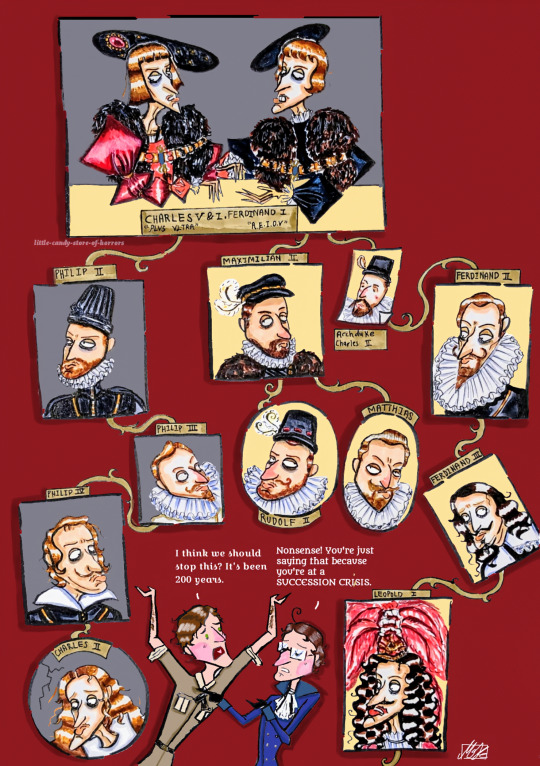
"Bella gerunt alii, tu felix Austria nube!"
Day 6 of @spaus-week 's challenge
"Let others wage war, you, happy Austria, marry!" Was the political strategy of the Habsburgs, and marry did the House of Austria! Infamously, scandalously, sensationally. A mangled wreath of a family tree. We all know this horror story. And we all know the bitter end.
After Emperor Charles V&I divided his Spanish and Austrian inheritance ((also gained through his parents' and grandparents' marriages)) to his descendants and those of his younger brother Ferdinand I respectively, the Habsburg dynasty split into two branches. The Spanish and Austrian Habsburgs notoriously intermarried for generations, right up till Charles II of Spain whose heirless death in 1700 sparked the War of the Spanish Succession. The inbreeding and this informal Latin motto behind it has been blamed to hell and back for their implosion, for the physical ugliness that ran in this royal bloodline. But it is not to say the Habsburgs never went to war, nor that dynastic marriage was a political strategy unique to them! But they were, if anything, bloody successful at it seeing how they did rule half of Europe for 200 years, and then a lot of it in the Austrian line for another 200. Before anyone figured out inbreeding was bad it was considered a privilege to marry into the Habsburgs, with Louis XV claiming that Louis XVI's betrothal to Marie Antoinette was marrying the "Daughter of the Caesars", and Napoleon Bonaparte infamously ditching Josephine for Marie Louise. Charles II was a poor sod who took the fall and the mugs were wretched from the same ugly gene being passed around countless times*, but they did wear power and privilege well.
💅✨ Symbolism bc I'm a NERD and this my Category 10 autism event ✨💅 :
Charles V & Ferdinand I's joint portrait based on that propaganda woodcut, behind them the colours of the Habsburg flag.
The Spanish branch, comprising Charles V & I's descendants, is represented with a black background, and the Austrian branch, comprising Ferdinand I's descendants, gold, both colours pulled from their flag, a dynasty intertwined but split in two.
Round frames denote that the individual had no heirs.
Only the most influential ruler on both sides, the King of Spain and the Holy Roman Emperor, are represented as framed portraits, explaining Archduke Charles II's unframed depiction.
The unconventional placement of Charles II of Spain and Emperor Rudolf II's nameplates are a nod to their queerness: their intersexuality and bisexuality respectively.
Ferdinand III's portrait is lopsided because of the losses of the 30 Years War.
Cracks in Charles II's portrait: 🙃🙃🙃
#Was this just an excuse for me to draw the family tree/wreath? YES. Might continue it to Blessed Karl™ *faints*.#That said i literally took three tries to get the Austrian branch right in just this fraction. Nightmare.#spausweek#Charles v#philip ii#philip ii of spain#Philip iii#philip iv of spain#felipe iv#charles ii of spain#Carlos ii#ferdinand i#Maximilian ii#rudolf ii#Emperor Matthias#Ferdinand ii#Ferdinand iii#Leopold i#16th century#17th century#habsburg history#house of habsburg#austrian history#spanish history#historical hetalia#aph austria#aph spain#roderich edelstein#Antonio Fernandez#Hetalia
65 notes
·
View notes
Text

Crown Prince Archduke Rudolf of Austria, Prince of Hungary dressed in the Imperial Regalia as the Holy Roman Emperor Rudolf I of Habsburg.
#kaisertum österreich#heiliges römisches reich#haus habsburg lothringen#crown prince#rudolf of habsburg#erzherzog#erzherzogtum österreich
41 notes
·
View notes
Text
letzte rose - prologue

Toto Wolff x Susie Wolff Royal/Historical AU
Summary: The year is 1849 and one of Europe's Great Powers, the Austro-Hungarian Empire, is on the cusp of burgeoning unrest. Parliament is trying to seize more authority while the provinces are fighting for more autonomy. An increasingly conservative chancellor seems to hold all of the power these days, as Emperor Christian I has become practically a recluse in recent years. But, a night at the opera has the potential to change everything.
Notes: I've been toying with the idea of some sort of Susie/Toto historicial AU for a while, but @totowlff approached me about this royalty AU and it's been impossible to get my mind off if it. She wrote most of this chapter (I edited it pretty heavily) and the chapter outline we have so far, and I'm really excited to see how it develops. Thank goodness for her pretty much encyclopedic knowledge of old European monarchies! I hope you like it, too. We are striving to make it as historically accurate as it can be, minus the fact that obvious major "characters" have been replaced.
There are certain moments when a person knows that their life will never be the same.
For Toto, it was a warm night in May of 1812, when he was just 15 years old.
He didn't remember anything exceptional about that night before he was woken up in the middle of a dream he was having.
A little confused, it took him a few seconds for his sleep-filled eyes to focus on the face of Karl, his Kammerdiener. Holding a small candelabra, his expression hid something that the young archduke could not puzzle out as he rubbed his eyes.
— What…
— I beg your pardon, sir, but your mother requested His Imperial Highness’ presence in her chambers.
— But why? — he asked, as he pulled his covers back and sat up in bed.
— Unfortunately, I don’t know, Your Highness — Karl replied, placing the candle on the bedside table — I’m just following the orders I received.
After helping him to his feet into a robe, Toto’s valet walked him through the halls of the Hofburg. Toto wondered what could be so important that she would get him out of bed in the middle of the night and walk halfway across the palace to Amalienburg, where the apartments of Archduchess Johanna of Austria were located. However, as he approached his mother's quarters, he noticed there was an awful lot of staff milling about, especially for the middle of the night. “Something is definitely wrong”, Toto thought, as his mother’s valet opened the door for him to be announced.
From then on, everything became a blur. The slow steps towards the anteroom. The sight of his mother sitting in one of the armchairs, her wet eyes indicating that she had been crying. Her deep breath before saying the words that changed his life forever.
— Long live the Emperor — Johanna said, before bowing deeply in front of him.
Toto left his mother's room a few minutes later, in complete silence. Accompanied by Karl, he headed back to his own quarters feeling completely numb.
That night, it wasn't just his grandfather, the old Emperor Rudolf VI, who had died. In a way Toto had, too. Toto, the boy who loved numbers, who protected his family with all his might and who liked to race horses was gone too, along with the boy who thought his destiny would have had the courtesy to wait a few years.
From the moment his grandfather’s death was pronounced, there was only His Imperial and Royal Apostolic Majesty, Christian The First, By The Grace of God.
Distrust was his constant companion, especially in the early days of his reign. Whispers about how he was too young and inexperienced for the role filled the palace halls with uncertainty. In the opinion of many, including politicians and the court, Toto should entrust matters of governance to the hands of those who understood the empire’s politics and go back to playing with his horses.
However, it was not in his nature to leave his responsibilities to others, especially to men who only thought about themselves and their own legacies. Toto wanted to govern for his people, for the people who looked to him and his family as a model to follow. Over the next nine years, he took over the reins of his own country, assembling a cabinet capable of forging a new Europe. Toto would always remember the relief on his mother's face when she spoke about Napoleon Bonaparte’s death in exile, definitively ending his reign.
— Your aunt will be immensely pleased to know that, finally, the devil is in Hell like he deserves to be, and he won’t be coming back this time — Johanna said with a wide smile on her face, during Toto's daily visit to her apartments.
— I don't know if that's the most appropriate way to speak of the dead, especially considering that he was, in a way, part of our family — he observed, pursing his lips. In order to reestablish peace between Austria and France, Toto's grandfather arranged for his other daughter, Elisabeth, to marry Napoleon. The union produced a single son, named Alexander, who became the presumptive heir to his father's ambitions and a major headache for the great powers. However, his proximity with his maternal family was the allegation that Chancellor Metternich said in the meeting with the other chancellors to convince them that Toto’s cousin was not a political threat to Europe.
— Alexander will always be a problem, especially considering that you still haven't resolved the issue of your marriage — his mother replied, brushing a dark curl away from her face.
— I just turned 24, mama…
— When I was your age, I was already married and had both you and your sister — she replied, as Toto shook his head — And there's no point in making that face, you know you have a duty to this country.
— Yes, my duty is to govern it. That is what I am primarily focused on.
— And what good is governing if you don't provide security for your subjects, my son? Nothing gives a nation’s people more security than knowing they don’t have to worry about any bloody succession crises. You don’t want what happened in Britain to happen to us, do you? Even your grandfather couldn’t feel at ease until you were born...
— Considering that Lili already has a son, I’m not overly concerned about who my successor will be — Toto said, with a small smile. This made his mother jump from her seat, giving her son a venomous glare.
— I think this should worry you even more, since your sister is younger than you and has already done more for the future of this family’s dynasty. Something about that statement annoyed Toto deeply. Slowly standing up, he turned away from his mother and walked towards the window, taking a deep breath. He couldn't be fragile, not now, not in front of her.
— If the matter concerns you so much, mama, I give you leave to resolve it — he said. His voice was solemn, but indicated clearly that he was done discussing it.
It took a few years to find a suitable match, but in 1825, at age 28, Toto was standing in the foyer of The Hofburg, greeting his new wife for the first time as she arrived from Munich. She was a Bavarian princess from the house of Wittelsbach named Stephanie. The marriage was arranged at the behest of Johanna and performed per procura before she and Toto had even met. They had exchanged a few letters, and Toto had seen her portrait, but this was the first time they were meeting.
With a shy smile and her blonde hair hidden under her wide-brimmed bonnet, she was clearly scared by it all, especially given how tightly he was gripping his hand.
— Nervous? — he asked her quietly.
— A little — Stephanie replied, nodding to some courtiers that were lined up to see her arrival in the palace for the first time — Let's just say I wasn't expecting...
— All these people?
— No, I'm talking about, well… Your Majesty.
— Was the portrait I sent not true to life? I told the painter not to make my nose so much smaller than it is, but they never listen to me — Toto said, as the air around them filled with quiet chatter and the clinking of military medals as highly decorated courtiers bowed in respect as the imperial couple walked by.
— Actually… I’d say that you are much more handsome than they made you look in your portrait — the princess said sweetly, her cheeks flushed.
It was with that sweetness that Stephanie entered Toto's life and heart. He didn't know how to feel about her at first. She was beautiful, certainly, and kind, but was Toto in love with her? Hardly. Love wasn't the purpose of their marriage; people like Toto didn't get the privilege of marrying for love.
As time went on, though, Stephanie proved to be a measured and gentle sort, who had no trouble taking on her role as the Empress of Austria and winning over the hearts of the courtiers and public, and eventually, she won Toto's heart as well. It took a few years for their family to grow, but the entire country celebrated with the arrival of the long-awaited heir, a boy named Benedict. Two years later, a little girl followed, and they named her Rosa, contrary to Johanna’s wishes, who had hoped for the girl to have her name.
For years, The Hofburg was a place full of light and joy, and Toto ruled a thriving empire from within it. With his family together, he was sure that nothing could shake him, not even the biggest challenge.
Until one bitter February day in 1836, Stephanie whispered his name as she closed her eyes for the final time.
All of the light and joy that filled the palace was buried with her in the Imperial Crypt.
#f1 fanfic#f1 au#f1 historicial au#f1 royalty au#series: lezte rose#toto wolff fanfic#toto wolff x susie wolff
11 notes
·
View notes
Photo
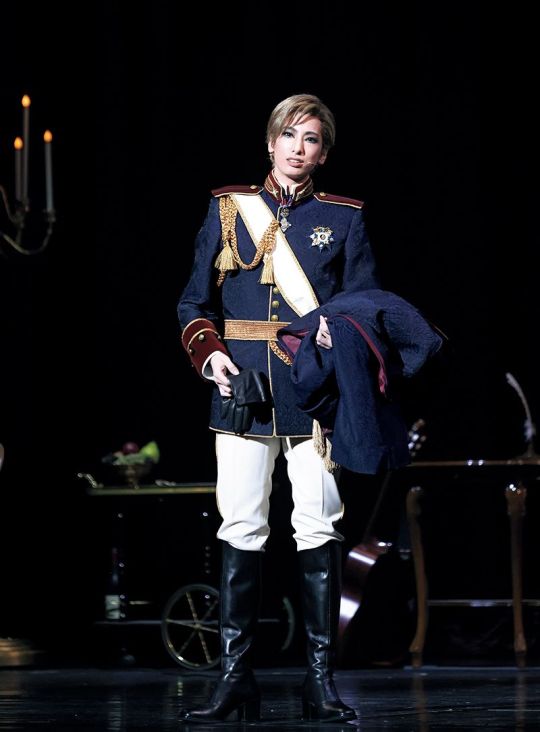
【Takarazuka・Flower Troupe】Yuzuka Rei The set of the “Double-headed Eagle”, the dance ball...an assembly of glamorous beauty. The stage set in the politically unstable 19th century Austria, it portrays the story of the joy and struggle of finding true love
【寶塚・花組】柚香光 以「雙頭鷹」為舞台的舞會⋯集結了美輪美奐的美感。舞台設置在政局動蕩的19世紀奧地利,描繪了尋找真愛的快樂與掙扎
(Original article from Fujin Koron 原文來自婦人公論)
The set of the “Double-headed Eagle”, the dance ball and the numerous military uniforms and dress – all of this is an assembly of glamorous beauty. This famous work by Shibata Yukihiro was performed again and again, and this time it would be revived in the Grand Theatre after 30 years under the adaptation and direction of Koyanagi Naoko. Yuzuka delivers the joy and struggle of finding true love. It is refreshing to see how the tragic love story of Rudolf and Marie was approched as a human drama in the politically unstable 19th century Austria.
「雙頭鷹」的佈景、舞會和眾多的軍服、長裙——這一切都是美輪美奐的集結。在小柳奈穂子的潤色和執導下,時隔 30 年後在大劇院再演。柚香光傳達了尋找真愛的喜悅和掙扎。看到魯道夫與瑪麗的悲戀在如何政治動蕩的 19 世紀奧地利燃起愛火是富有新鮮感的。
The dignity of the Habsburgs and how dangerous it was
Compatible with the blonde hair, and other matters such as the military uniform, Yuzuka Rei plays the role of Rudolf, the Crown Prince of the Austra-Hungarian empire.
While associated with the dignity of the Habsburgs, he also faced the danger of being confined to positional restrictions.
Upon a fateful encounter, he met Marie whom he looks at her with gentle eyes, calling her “a little blue flower”.
哈布斯堡王朝的尊嚴與危險
與金發、軍服等相得益彰的是,柚香光飾演的奧匈帝國皇太子魯道夫一角。
在與哈布斯堡王朝的尊嚴聯繫在一起的同時,他也面臨著被局限於皇太子位置所限制的危險。
一次宿命的邂逅,他遇見了瑪麗,他用溫柔的目光看著她,稱她為「一朵藍小花」。
◆ Summary of “MAYERLING” 「梅耶林」概要
In 19th century Vienna, Crown Prince Rudolf (Yuzuka) spent his every day bound by a political marriage without love and his affairs, aspiring to lead a free life just like his cousins such as Johann Salvator (Minami Maito). One day, Rudolf fell in love with the pure baroness’ daughter Marie Vetsera (Hoshikaze Madoka). Unaware of the looming political conspiracies, they often met up again and again...
19世紀的維也納,皇太子魯道夫(柚香)的每一天都被沒有愛情的政治婚姻和事務所束縛,憧憬要過著像他的表兄弟約翰 · 薩爾瓦多(麻衣美奈美飾)一樣的自由生活。有一天,魯道夫愛上了純潔的男爵夫人的女兒瑪麗 · 韋瑟拉(星風まどか),不覺政治陰謀在即,兩人屢屢相見⋯

Minami plays as Johann Salvator. Taking the role of a storyteller, she plays a man who celebrates freedom, showcasing kindness and masculinity naturally.
水美飾演約翰 · 薩爾瓦多。如同故事的旁白,她很自然地飾演一位善良、呈現男性魅力,高呼自由的男人。

Towaki Sea plays as the Archduke Franz Ferdinand, whose role was more deepened in this rendition. Her acting radiates the reflection of passing of time in light and shadow.
永久輝せあ飾演法蘭茲・斐迪南大公,隨著再演變得再給深化的角色。從她的演技,反映著時光的光與影。
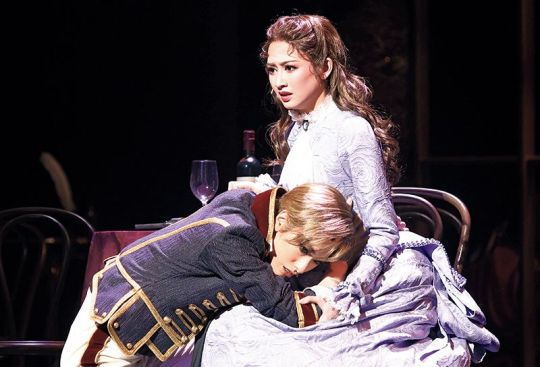
It was impressive to see that Marie is not only cute, but also shows a sense of motherhood and Rudolf almost seem like finding her for salvation.
看到瑪麗不但可愛,也有母性的一面,魯道夫更要向她尋求救贖,是很深刻印象的。
Takarazuka Spectacular “ENCHANTEMENT–Luxurious Perfume–” 「–ENCHANTEMENT–華麗的香水」
This is a revue delivered by Noguchi Kousaku which is inspired by the “ka” (香 = scent) from Yuzuka Rei’s name.
It’s a beauty and glorious performance delivering the sweet and fragrant scent to the audience.
Not only is there the forest in Paris, but also the NY streets and a night club where the gentlemen are assembled.
It is exploding with the various colours and charms of this stylish Flower Troupe.
It looks like a hot dance battle in the night club where the men are wearing unique suits. It is heart-fluttering to see the connection between doukis Minami and Yuzuka.
這是野口幸作的一個レビュー,靈感來自於柚香光名字中的「香」。
這是一場美麗而輝煌的表演,為觀眾帶來甜美芬芳的香氣。
不僅有巴黎的森林,還有紐約的街道和紳士云集的夜總會。
時尚花組爆發著各種色彩和魅力。
男人們穿著獨特的西裝,就像是在夜總會裡進行一場火熱的熱舞大戰,看得見同期水美和柚香之間的聯繫,讓人怦然心動。
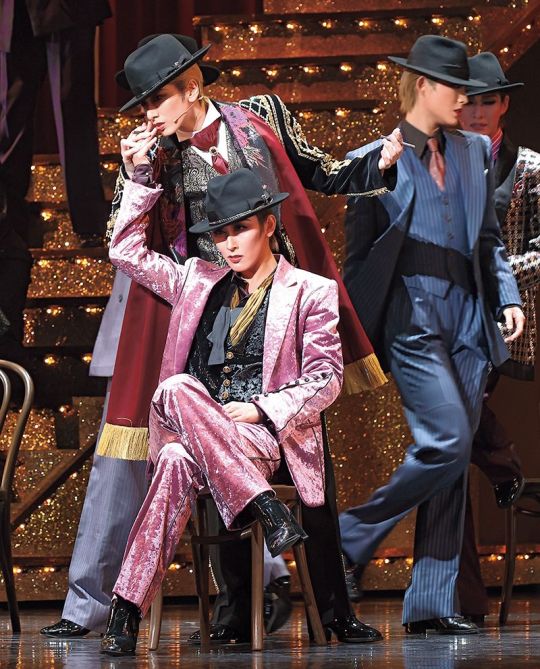
#yuzuka rei#hoshikaze madoka#minami maito#towaki sea#柚香光#星風まどか#水美舞斗#永久輝せあ#花組#flower troupe#takarazuka#hibiscustranslation
38 notes
·
View notes
Text
More pics from Producers Showcase: "Reunion in Vienna," April 4, 1955 [Television]
(Since it's been on my mind lately.)
This is the one where Peter played a character named Poffy, full name of Pofferoff.
At least, I believe these pictures are from this show; these came with no source. But the faces, ah the faces!
Here's the pic that started it off, from this post. Peter Lorre, Brian Aherne, Greer Garson, and Robert Flemyng:
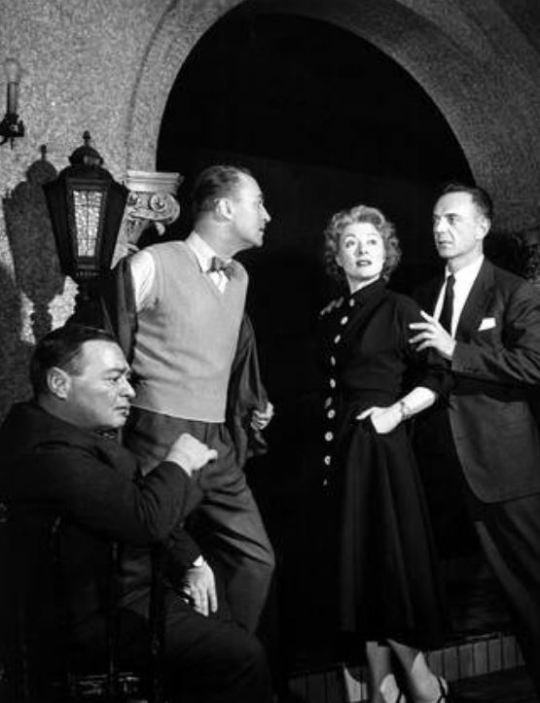
Here's Peter Lorre and Robert Flemying:
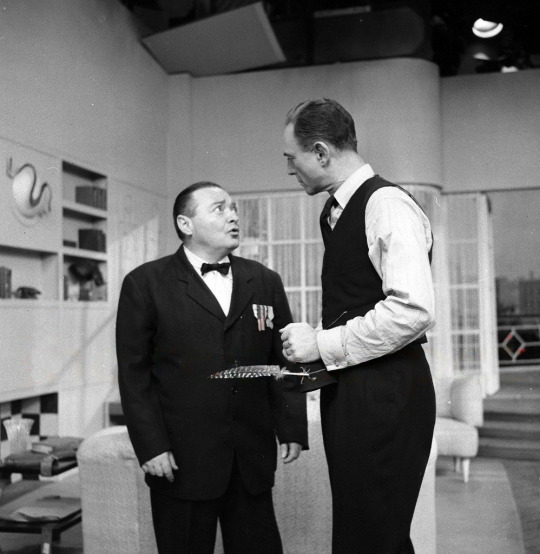
Peter Lorre with Greer Garson:

Next, we have Edith Meiser (I think), Greer Garson, Robert Flemying, Peter Lorre, and hell if I know - Lili Darvas? Cathleen Nesbitt?
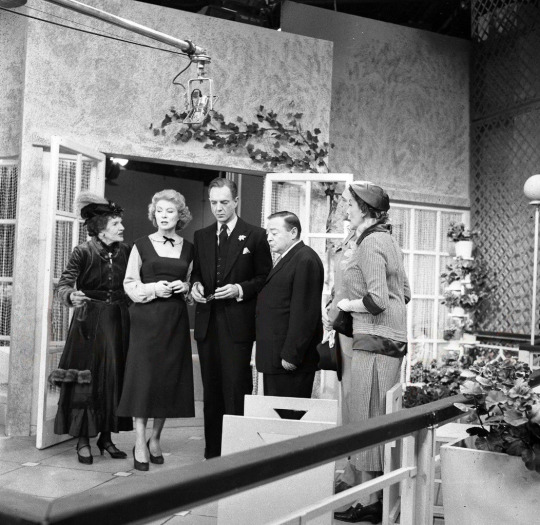
And Peter Lorre with Edith Meiser:

Plot: An archduke who had been banished from Austria returns to Vienna for a reunion of his old fellow aristocrats and meets up with the former love of his life, who is now married to a psychoanalyst. - IMDB
Updated Oct 13, 2023:
A slightly clearer picture from eBay of the top image, but on the back it reads:
"A lovely Viennese matron (Greer Garson) intercedes between her embattled husband (Robert Flemyng, right) and her former great love, the Archduke Rudolf (Brian Aherne, left), as a family friend (Peter Lorre, seated, left), appears embarrassed."
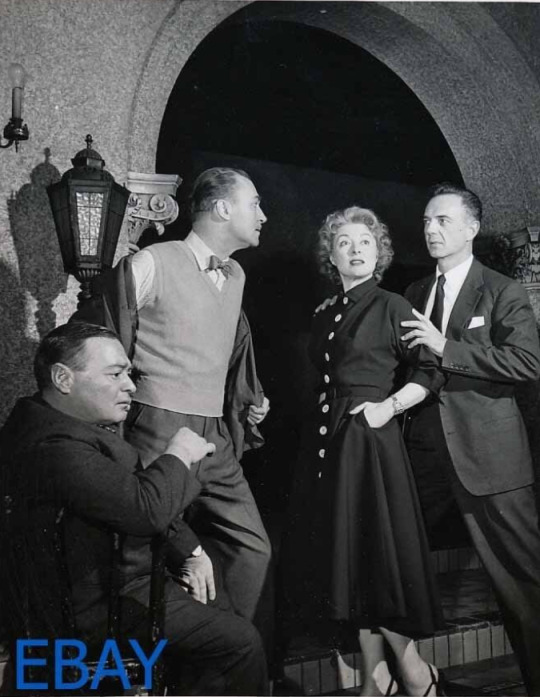

Found another lovely pic of Peter and Greer:

#peter lorre#POFFY#television show#peter lorre television#lost media#producer's showcase#greer garson#Reunion in Vienna#1950s television
24 notes
·
View notes
Photo



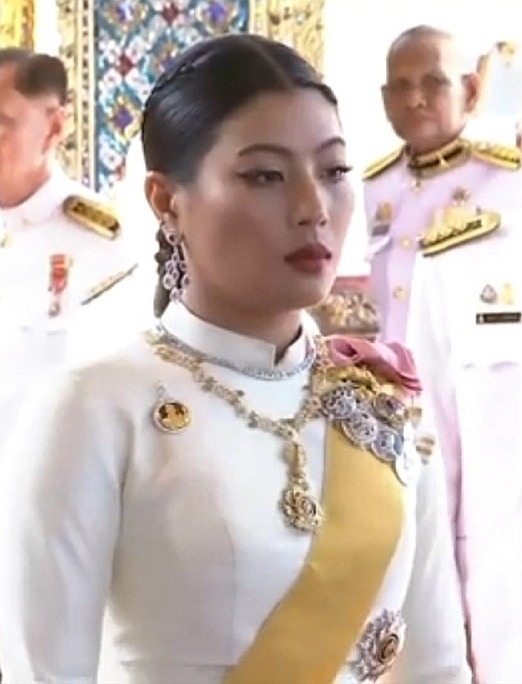


Royal Birthdays for today, January 8th:
Rudolf, Archduke of Austria, 1788
Prince Albert Victor, Duke of Clarence and Avondale, 1864
Elena of Montenegro, Queen of Italy, 1873
Sirivannavari Nariratana, Princess of Thailand, 1987
Josephine, Princess of Denmark, 2011
Vincent, Prince of Denmark, 2011
#Archduke Rudolf#prince albert victor#elena of montenegro#Sirivannavari Nariratana#Princess Josephine#prince vincent#royal birthdays#long live the queue
33 notes
·
View notes
Text
The thing is... I'm obsessed with historical accuracy in my crownprince rudolf fanfiction, and I'm also a grad student, but I could never do Rudolf history like for real seriously because
1. I have brainrot (hasn't stopped people before but there are many topics I wouldn't approach objectively)
2. I don't like monarchies like at all akdkflf I think it's a genuinely terrible system of governance and should be abolished everywhere. Doubly so for empires. And with history you need to be able to try to understand the context, time period and system you're studying "as is" to look for cause and effect and explanations, even if it's terrible. I'm too much of a hater basically
3. Most importantly... modern habsburg descendants are fucking annoying 😭😭 stop calling yourself archdukes etc, you guys were legally made normal citizens, stripped of all power, and used to be unable to even visit Austria until the EU forced them to change those laws (because they violated human rights afjkdkd) in 1995. Why are you so high and mighty about your ancestors it's cringe 💀 When researching real people you often have to deal with their living descendants because they're in possession of family history documents and other primary sources. Which I would be unable to do because I'm too much of a hater. Omg I don't want to get into this too much but it's wild and annoying to me that Finland also retains a system of "nobility" and some people act high and mighty about their families 💀 It should've been abolished in 1917 tbh and it's a shame it was not
Anyway yeah I'm glad there are other people who are seriously researching this stuff, but at the same time I get extremely annoyed at bad depictions and wish I could contribute to dismantling them 😭😂💀
5 notes
·
View notes
Photo


Still framed in its "Historismus" (Historicism) frame, this small oil painting is a typical work of well-known Austrian orientalist and military painter and illustrator, Baron Rudolf Otto von Ottenfeld.
It shows two cavalrymen from the Austrian Hussar-Regiment No.2 ("Archduke Josef") from the 1st half of the 19th century.
Baron Rudolf Otto von Ottenfeld (1856 Verona - 1913 Prague) was a very well-known battle and orientalist painter. He studied at the Vienna Academy of Fine Arts under Würzinger and (largely) one of Austria's best orientalists, Carl Leopold Müller. In 1882/93 he lived in Munich; in 1893-1900 in Vienna; from 1900 in Prague, where he held professorship at the local academy.
https://www.ebay.com/itm/274671438503?hash=item3ff3b18aa7:g:rTkAAOSwoyRgHATi&amdata=enc%3AAQAHAAAAoFTgxapIIYDUHxWZxlDQ5dUvyDGv4%2FfK%2BWcgpjE2FD2O%2BiT78HMp7Hj3splIdn0cdhMxnrWXcj1hyNNA09lr6%2BHahNXVvPkcaLHsTZSjKzyN4%2Fpq3FxLhIMSgP8H%2F3Uv13l7qW8sT9pbUpDyJw8xcX1Rn5QmsWoqNhIDx2Z0JK8SRQjshqFYnFtuoTCaQW7TKVU2SswmJjCTyk1Ybd0zNHM%3D%7Ctkp%3ABk9SR4K2krXUYQ
8 notes
·
View notes
Text
Mayerling (1936)
This one was really good, I absolutely loved it, but I do have one pretty big issue with it, that shall go into detail about a bit later.
This film starts off with Rudolf getting arrested at a student protest and hanging out a bunch with Seps while Taafe and the head of the secret police are trying to prove that theyre in cahoots, which excited me because although some of the previous ones did focus on Rudolf a lot, they didnt really focus on his politics in favor of showing us his always-strangely boring affair with Mary Vetsera, but then Seps' newspaper gets shut down and he has to flee and then we never hear from him again and the only political stuff in the rest of the movie is just like "oh, the baroness is cheating with the archduke whos already married, much scandal". So that was disappointing, but it's not the big issue I have with the film, and I was ultimately able to get invested in the relationship between Rudolf and Mary.
That's mainly because I thought Rudolf was very interesting. An issue that I had with both Elisabeth von Österreich (1931) and Das Schicksal derer von Habsburg (1928) was that Rudolf seemed like a fairly normal, well-adjusted guy which made his suicide feel very weird and kind of confusing. Like, I think if I had seen either of those films without knowing the actual history, during those scenes where he approached Mary to be like "my request for a divorce didnt go through. you know what we have to do now in order to be together", I wouldve thought that he was talking about running away together or something, like what people do when theyre crazy and in love but still, yknow, relatively mentally healthy. In those movies, there wasnt really any buildup to the suicide or to Mary wanting to die with him, but I think here they did a good job at portraying Rudolf as this complicated and tormented guy, I really liked Charles Boyer's performance.
Unfortunately, I cant say the same for Mary, who, like in the previous films, was just kinda portrayed as a very normal woman, even though willingly being in an affair with the heir to the throne of austria and then being willing to follow him when he commits suicide is pretty wild, at least in my humble opinion. This is the big issue I have: she came across as just this one-dimensional ingenue who didnt have any thoughts about what she was doing or her relationship with Rudolf beyond like "everything is all right because our love is pure", but I didnt really feel like the film made me understand why she would love him as deeply as she does. I can certainly understand why Rudolf loves her like that, she's this comforting, bright prescence in his dark dark life, but what does this sheltered 17 year old see in this weird, unstable, unfaithful manwhore? The only thing that's ever said is that she sees the sadness and the pain in his eyes, but idk. call me cynical, but that just isn't enough for me. But even beyond that, again, I really dislike how she has no inner life and doesnt seem to ever self-reflect and never expresses any opinion about Rudolf beyond like, after her second time meeting him she tells her governess that he's handsome.
There's this scene that's really emblematic of the issues I have with her characterization while also being one of my favorite scenes in the whole film. Basically, Mary's mother finds out about her daughter being in an affair with an unnamed man through an anonymous letter and when she refuses to tell her who it is, she sends her away to live with her uncle for 6 weeks. We hear that during those weeks, Rudolf has constantly been drunk and sleeping with a bunch of women and we see him at a brothel having.... not a bad time per se, but he's clearly not all there. When he looks in a mirror, he doesnt recognize himself and starts yelling at his own reflection before pulling out a gun and shooting it several times. Then someone approaches him to tell him that a pretty woman is waiting for him at the entrance and leads him there. The pretty woman is Mary, who just returned from her uncle's place and managed to escape her mother because she wanted to see him as soon as possible, and Rudolf immediately takes her to a private room because he doesnt want anyone to see her. There, Mary notices what she thinks is blood on his neck and gets concerened, but he tells her that its just lipstick from a prostitute. She doesnt say anything in response, but Rudolf starts ranting at her about how yes, he kissed prostitutes and he's allowed to do that if he wants because he hasnt tied himself down to Mary so it doesnt matter, while she just stays silent and expressionless. He gets increasingly more upset as he rants and ends up grabbing Mary by the shoulders and yelling at her that, if she doesnt say anything now, he never wants to see her again. I forgot what exactly she told him, but I think it was just something along the lines of "I'll love you no matter what". Then Rudolf calms down a bit and basically repeats "I dont know how you can love me, you can't actually love me when Im like this" while she assures him that she does love him.
This scene really demonstrates the duality of their relationship as presented in this film; Rudolf is this complicated and tormented mess of a person while Mary is just a doll looking at him with her beautiful blank face. Like, I cannot stresss enough how little emotion she shows during that scene and many others. And I dont think its because she's played by a bad actress, I actually really liked Danielle Darrieux's performance and I think she could have portrayed Mary with a lot of depth, if only she had any.
But with my big issue out of the way, I'd like to talk about all the things that made me love this movie regardless
I already talked about how I liked Rudolf, but I absolutely LOVED Gabrielle Dorziat as Elisabeth here despite her having a very minor role. Theres this small scene where she wants to see Rudolf but finds Mary instead and they talk for a moment that I think gave her a lot of depth, again, despite the fact that she only had a few small appearances in less than a handful of scenes.
The pacing and editing were on-point, like The King Steps Out (1936) this movie felt like it was longer than 90 minutes in a good way, and I adored the score, it added so much to the wonderful atmosphere of this whole thing. Or, well, maybe 'wonderful' isnt the right word here, this is a fairly dark film, but it was very well-executed. Places like the opera in the ballet gala scene or the ball at the end have this beautiful grandness about them, while the brothel Rudolf visits and even the fair where he and Mary first meet are dingy and kind of grimy, and the ending at Mayerling is so dark and melancholic and tense, my heart was racing with this horrible anticipation for basically the last 10-20 minutes, it was so good. I was gonna talk about it in more detail but honestly, I dont want to spoil it too much, you should definitely watch it for yourself when you can. I found it (and most of the movies I will review) on ok.ru, its a french movie but I was able to find it with english subtitles on there.
So yeah, all in all, its a good movie, I wish the creators had cared more about Mary but that's it.
0 notes
Text
Events 1.30 (before 1940)
1018 – Poland and the Holy Roman Empire conclude the Peace of Bautzen.
1287 – King Wareru founds the Hanthawaddy Kingdom, and proclaims independence from the Pagan Kingdom.
1607 – An estimated 200 square miles (51,800 ha) along the coasts of the Bristol Channel and Severn Estuary in England are destroyed by massive flooding, resulting in an estimated 2,000 deaths.
1648 – Eighty Years' War: The Treaty of Münster and Osnabrück is signed, ending the conflict between the Netherlands and Spain.
1649 – Charles I of England is executed in Whitehall, London.
1661 – Oliver Cromwell, Lord Protector of the Commonwealth of England, is ritually executed more than two years after his death, on the 12th anniversary of the execution of the monarch he himself deposed.
1667 – The Truce of Andrusovo is signed, ending the Russian-Polish War of 1654-1667.
1703 – The Forty-seven rōnin, under the command of Ōishi Kuranosuke, avenge the death of their master, by killing Kira Yoshinaka.
1789 – Tây Sơn forces emerge victorious against Qing armies and liberate the capital Thăng Long.
1806 – The original Lower Trenton Bridge (also called the Trenton Makes the World Takes Bridge), which spans the Delaware River between Morrisville, Pennsylvania and Trenton, New Jersey, is opened.
1820 – Edward Bransfield sights the Trinity Peninsula and claims the discovery of Antarctica.
1826 – The Menai Suspension Bridge, considered the world's first modern suspension bridge, connecting the Isle of Anglesey to the north West coast of Wales, is opened.
1835 – In the first assassination attempt against a President of the United States, Richard Lawrence attempts to shoot president Andrew Jackson, but fails and is subdued by a crowd, including several congressmen as well as Jackson himself.
1847 – Yerba Buena, California is renamed San Francisco, California.
1858 – The first Hallé concert is given in Manchester, England, marking the official founding of The Hallé orchestra as a full-time, professional orchestra.
1862 – The first American ironclad warship, the USS Monitor is launched.
1889 – Archduke Crown Prince Rudolf of Austria, heir to the Austro-Hungarian crown, is found dead with his mistress Baroness Mary Vetsera in the Mayerling.
1902 – The first Anglo-Japanese Alliance is signed in London.
1908 – Indian pacifist and leader Mohandas Karamchand Gandhi is released from prison by Jan C. Smuts after being tried and sentenced to two months in jail earlier in the month.
1911 – The destroyer USS Terry makes the first airplane rescue at sea saving the life of Douglas McCurdy 16 kilometres (10 mi) from Havana, Cuba.
1920 – Japanese carmaker Mazda is founded, initially as a cork-producing company.
1925 – The Government of Turkey expels Patriarch Constantine VI from Istanbul.
1930 – The Politburo of the Communist Party of the Soviet Union orders the confiscation of lands belonging to the Kulaks in a campaign of Dekulakization, resulting in the executions and forced deportations of millions.
1933 – Adolf Hitler's rise to power: Hitler takes office as the Chancellor of Germany.
1939 – During a speech in the Reichstag, Adolf Hitler makes a prediction about the end of the Jewish race in Europe if another world war were to occur.
0 notes
Text


1889, 29 January we had a family dinner at which Rudolf, whom I last saw at the opera on 22 January, did not appear. He was hunting in Mayerling and had Philipp Koburg [Rudolf's brother-in-law] tell him that he had a slight cold and fever and preferred to stay outside quietly. - Oh dear God, how am I to continue writing now?
On Wedenesday, 30 January, everything was already packed to travel to Ofen on Thursday. At 12 o'clock I was just before dinner with Louise and Margit, when Gusti told me that Mama had sent for me. I hurry up quite merrily and find Mama [Empress Elisabeth] in my bedroom. "Rudolf is very ill - no hope (I sat on her lap) - you'll go pale - it's the very worst." I don't know why I say: "Has he killed himself?" And then, as Mama asked, so frightened, why I thought that, I knew. We knelt down, but you can't pray properly at such moments. Mama told me to be quiet like her, because of Papa [Emperor Franz Josef], and I was. She herself had told him the news brought by Count Hoyos and while my thoughts were still with him, who had not been spared this bitterest of things, he himself entered. - Words cannot tell how painful it is to look at him; I fell around his neck. We held each other and wept, and his heroic example sustained Mama and me.
I was now sent to Stephanie [Crown Princess of Austria] to bring her over. Everything, everything, Countess Tarouca had told her, unhappy woman! She kept asking us all to forgive her, for she must have felt that her lack of devotion had helped to drive Rudolf to this dreadful thing. Mama was sublime with her, loving and almost motherly, without bitterness.
Franz [Archduke of Austria-Tuscany, Valerie's fiancé] was my consolation: one must give oneself completely to God. But Mama says: "The great Jehovah is terrible when he comes witheringly like the storm." In the evening, Mama says it's not quite certain yet whether Rudolf killed himself. People say: Heartbeat. Thousands of them stood on the Burgplatz and the soldiers sat on guard reading the newspaper. Our Papa was calm, godly, heroic and holy. I couldn't look at him without crying.
Archduchess Marie Valerie of Austria (1998), Das Tagebuch der Lieblingstochter von Kaiserin Elisabeth (1878-1899) (Translation done by DeepL. Please keep in mind that in a machine translation a lot of nuance may/will be lost)
#interestingly stephanie later said that she felt that everyone blamed her for rudolf's death - but she never considered herself guilty#archduchess marie valerie of austria#crown prince rudolf of austria#empress elisabeth of austria#franz josef i of austria#stephanie of belgium crown princess of austria#archduke franz salvator of austria-tuscany#das tagebuch der lieblingstochter von kaiserin elisabeth von österreich#on this day in history#cw suicide#tw suicide
42 notes
·
View notes
Text

Charles Garabed Atamian - Archduke Rudolf kills himself and his mistress, Baroness Mary Vetsera, in his hunting lodge at Mayerling.
Archduke Rudolf, Crown Prince of Austria (1858-1889), kills himself and his mistress, Baroness Mary Vetsera, in his hunting lodge at Mayerling - Drama of Mayerling: Archduke Rodolph of Habsburg (Archduke Rodolph of Habsburg) (Habsburg-Lorraine) (1858-1889))
#Charles Garabed Atamian#Archduke Rudolf#suicide#Archduke Rudolf kills himself and his mistress#death#murder
1 note
·
View note
Text
Mirrorverse historical timeline thoughts:
Under the cut because it is long as f*ck.
Before any commentary can be made, I have to acknowledge we have not nailed down the current 6 fics to a specific date. The six fics currently cover ~2 years or so, with the vast majority of that coming from “In the Mirror (Darkly).” Taaffe is Minister-President by the end of the fics and seems to have been so for a reasonable length of time - this means we are looking at an earliest start date of say, 1878 and the latest start date of 1891 based on that alone. Because of Mayerling implications, I’m going to bring the latest possible start date down to 1887.
This gives us a start date of between 1878 and 1887 which give Taaffe death dates of 1880 and 1889, respectively.
Some comments on what happens during this period in Rudolf’s life (historically):
1881: Rudolf gets married
September 1883: Rudolf’s daughter was born. Rudolf and his wife were essentially separated by this time.
1886: Rudolf buys Mayerling
This would lend to choosing a start date of 1887 - the latest possible. Everything can fit - Rudolf is estranged from his wife. Part of me does want to move the start date earlier because I feel like the way both Fitzrove and I have written Rudolf is more in line with a man in his early 20s than late 20s, but if that is my only gripe then I think we are doing pretty well.
If Taaffe’s death is in 1889, probably later in the year (assuming that the end of “In the Mirror (Darkly)” occurs on the same date that Mayerling historically did), then I don’t see FJ’s death being before mid-1890 at the earliest.
With all that out of the way, let’s get to the list of historical events that I think should be considered with regards to WWI implications which occur after 1890 and involve A-H:
1897: Russia withdraws support for A-H annexation of Bosnia and Herzegovina. This was done by the Russians so I don’t see any change.
1903: King of Serbia was assassinated in a coup. The new king is pro-Russia. A-H-Serbia relations deteriorate thereafter. Again, an action I don’t see any change for - this happened in Serbia.
1908: Bachlau - A-H foreign minister and Russian foreign minister decide to redraw some borders in the Balkans without talking to any other great powers. In the end Russia/Serbia back down. This was a pretty near-run thing with regards to starting WWI a few years early. Rudolf might have a different foreign minister, but most of the ... sketchy sh*t appears to have been on the Russian side (says the English wiki page), so I’m not sure I see a major change here.
1912: Balkan wars - (I’m lazy so have this from wikipedia)
Austria-Hungary, struggling for a port on the Adriatic and seeking ways for expansion in the south at the expense of the Ottoman Empire, was totally opposed to any other nation's expansion in the area. At the same time, the Habsburg empire had its own internal problems with significant Slav populations that campaigned against German-Hungarian control of the multinational state. Serbia, whose aspirations in the direction of Austrian-held Bosnia were no secret, was considered an enemy and the main tool of Russian machinations that were behind the agitation of Austria's Slav subjects. But Austria-Hungary failed to secure German backup for a firm reaction. Initially, Emperor Wilhelm II told the Archduke Franz Ferdinand that Germany was ready to support Austria in all circumstances — even at the risk of a world war, but the Austro-Hungarians hesitated. Finally, in the German Imperial War Council of 8 December 1912 the consensus was that Germany would not be ready for war until at least mid-1914 and passed notes to that effect to the Habsburgs. Consequently, no actions could be taken when the Serbs acceded to the Austrian ultimatum of 18 October and withdrew from Albania.
TLDR: A-H thought that Serbia was getting uppity and almost put them in their place. Germany was all like “Do It!” until they figured out they weren’t quite ready for war yet.
Most of what happened in the Balkan wars was actually the smaller states vs. the Ottomans, so again I’m not sure I see much change. A-H was interested in an Adriatic port, but that didn’t go so well.
That’s enough for now, I think. More to come later or tomorrow regarding Tod.
1 note
·
View note
Photo

Archduke Rudolf of Austria
Diana
146 notes
·
View notes